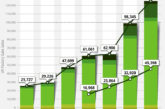
APHC has advised that there are major changes coming from HMRC that will affect VAT registered businesses with a turnover above the £85,000 threshold.
‘Making Tax Digital’ for VAT is going to mean that from 1 April 2019 around 1 million businesses will need to submit VAT Returns through compatible software and keep digital records.
VAT is said to be the first major phase in the Making Tax Digital initiative which was first announced by the government in 2015 as part of HMRC’s ambition of making tax administration more effective, more efficient and easier for taxpayers to get their tax right.
From 1 April 2019 VAT return data will need to be kept in a digital format and ‘digitally linked’ to HMRC so that transactions can be traced from source data (i.e. the purchase or sales ledger) through to VAT return completion and upload to HMRC.
HMRC define ‘digitally linked’ as the transfer or exchange of data made electronically between software programs, without the involvement or need for manual intervention. This can be achieved through software which connects to HMRC’s platform via an API (Application Programming Interface) so that data can be transmitted to and received from it. This is in much the same way as smartphone banking apps send and retrieve data from a bank’s system.
Bridging software is also available that will enable data to be taken from spreadsheets turning it into a compatible format and then validating it before submitting the information to HMRC. Bridging software takes the form of an add-in widget that users bolt onto a spreadsheet. HMRC have a list of suppliers who offer compatible VAT software on their website.
As Making Tax Digital for VAT will be available on a voluntary basis to businesses with a turnover below the £85,000 threshold, businesses need to determine whether they are impacted by the change. Businesses will need to monitor their taxable turnover on a rolling 12 month basis, to ensure they do not exceed the threshold for VAT and if they believe it might, they will need to prepare.
Businesses who have not commenced with the transition need to start reviewing their systems and processes to ascertain whether their current software is compliant or understand what changes or upgrades they may need to implement.
Additionally, if they haven’t already done so, APHC would advise business owners to seek advice from an accountant to explain how the new digital system will work, to recommend compliant accounting software, to help them changeover to the new system, and to stay abreast of any changes and updates the government might make.
It is important to note that while Making Tax Digital for VAT will change the manner in which VAT returns are submitted, it will not alter the deadlines or the frequency of VAT return filings.
HMRC have said that the Making Tax Digital initiative would be extended to taxes other than VAT by 2020 at the earliest.













